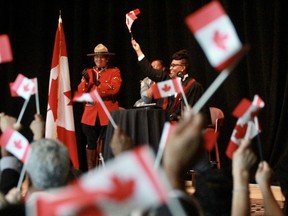Data obtained by National Post shows the government is planning to decrease permanent resident intake from 485,000 this year to 395,000 in 2025

OTTAWA — The Trudeau government will announce a dramatic immigration cut Thursday, reducing new permanent resident numbers by almost 100,000 in 2025 after years of consecutive increases to the country’s immigration targets.
Barring any last-minute changes, data obtained by National Post shows the government is planning to decrease permanent resident intake from 485,000 this year to 395,000 in 2025. It is then expecting to further cut intake to 380,000 in 2026 and 365,000 in 2027.
The new immigration levels are expected to be announced by Prime Minister Justin Trudeau on Thursday after being tabled in the House of Commons.
They come on the heels of a tense Liberal caucus meeting Wednesday in which dozens of MPs aired their grievances to Trudeau as the party has trailed Conservatives in the polls for over a year.
It’s also a marked shift in policy by a Liberal government that has steadily increased immigration levels since it took power in 2015.
The immigration target for permanent residents during the final year of the Harper Conservatives was under 300,000.
In a brief interview with National Post after the Liberal caucus meeting Wednesday, Immigration Minister Marc Miller neither confirmed nor denied the data. Miller has previously said the changes to PR levels would be “significant”.
“I’m not commenting,” he said on Wednesday. “It’s something you’ll have to wait for tomorrow.”
One source who was granted anonymity because there were not authorized to discuss the information publicly described the new levels as a “shock.”
For the first time, the government is also expected to set levels for temporary resident intake. The data obtained by The National Post shows the Liberals plan to lower the number of temporary resident applications by nearly 30,000 in 2025, to just over 300,000.
The drop in temporary resident levels isn’t surprising in light of comments by Miller in the spring that he wanted to drop temporary residents’ share of the population from 6.5 per cent to 5.2 percent in three years.
A large number of permanent residence intake programs are expected to be impacted by the new levels, according to the data.
The most significant cuts are expected to be absorbed by permanent resident applicants in the federal economic classes, which should be lowered by roughly 60 per cent next year before slightly increasing again in 2026 and 2027.
The Liberals are also planning on cutting permanent residences granted through provincial nominee programs by half next year to 55,000. They are expected to remain there until 2027.
The number of permanent residents granted through family reunification programs are also expected to be cut by roughly 20,000. The same cut is expected to the combined refugees and protected persons permanent resident levels.
While the government sets refugee levels, those can change dramatically based on the number of asylum claims they receive in a given year.
The drop in both permanent resident and temporary resident levels could help ease demand on housing and health-care services across the country, but it will also make it more difficult for employers looking to hire.
In September, Miller said in a speech that current immigration levels posed certain “challenges”, such as “increases in unemployment amongst youth and newcomers.” He promised in the fall to bring changes that would “re-calibrate” immigration volumes.
“The challenges, and actions needed, are clear: Canada has seen a sharp increase in the volume of temporary residents in recent years, driven by a rise in international students, and temporary foreign workers, in addition to a significant increase in asylum claimants,” he said.
“As we head into the fall, we will rebalance our system by setting the right number of newcomers as a critical part of a well-managed system.”
A recent Leger survey suggested that 65 per cent of Canadians believe there are “too many” immigrants currently in the country compared to just over one-fifth who believe current immigration levels are “about the right number.”
“The rise in the extent to which Canadians believe that there are too many immigrants is continuing and has yet again reached a new height,” Jack Jedwab, the chief executive of the Association of Canadians Studies, told National Post.
With additional reporting by Ari Blaff.
National Post
[email protected]
Our website is the place for the latest breaking news, exclusive scoops, longreads and provocative commentary. Please bookmark nationalpost.com and sign up for our daily newsletter, Posted, here.